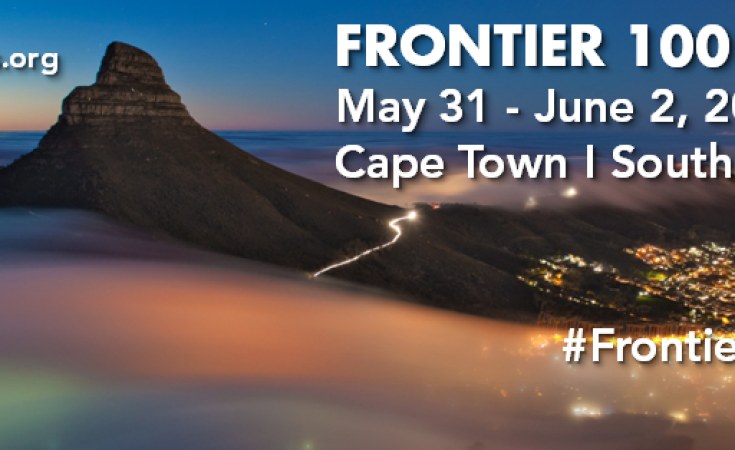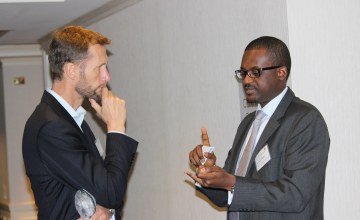LIVE BLOG: Frontier 100 Forum Session "How to Reach the Last Mile"
The first session of the Frontier 100 Forum explored models that reach the last mile, or those hardest to reach. Through the Rockefeller Foundation, IGD has explored how the Last Mile Alliance has used leverage points along their distribution chains to increase growth and access the last mile. How can other sectors take on those lessons? What ways do other companies access the last mile?
The panel was moderated by Johnathan Miller with a introduction by C.D. Glin (Rockefeller Foundation). Our discussion leaders included: Natalie Baatjies of Visa, Kate Mathias of Illovo Sugar Limited, Morgan Nzwere of SeedCo, Louis Otieno from Microsoft 4 Afrika and Ernest Ruzindaza from AGRA.
C.D. Glin from the Rockefeller Foundation started the session by highlighting the private sector's role in bringing sustainable change. The Rockefeller Foundation focus on how to reduce post harvest loss (PHL) by identifying steps within the supply chain that can help reduce loss. Doing so allows these farmers ultimately gain more access to affordable products as well as adoption of better techniques to reduce post harvest loss.
Reaching the last mile can be translated to various other sectors. Visa and Microsoft have done so by using technology. Visa's mobile money platform mVISA, provided financial access for 17,000 refugees. "Working with the World Bank, we've committed to reach 500 million [people] by 2020″, says Natalie Baatjies. Microsoft working with Spectra Wireless, created a service that allows students in Ghana to buy affordable high speed internet.
Seed Co's Last Mile Alliance (LMA), AGRA, and Illovo Sugar Limited all work within the agriculture sector to smallholder farmers in rural communities. LMA harnesses its network to address PHL in Tanzania's small holder farmer community by identified distributors in areas where farmers lacked access. By training those already connected to the network, their business has grown over 70% in the last three years. Illovo's cooperative model focuses on capacity building through education and social mobilization training. AGRA through policy and advocacy, AGRA works with agriculture ministers to broker deals and bring all actors within the agriculture industry to a common agenda.
Overall, discussion leaders agreed that reaching the last mile requires a unique model on shaped by the various needs of the local community. More collaboration between government, private sector to facilitate private-public partnerships (PPPs) can help create an environment that fosters inclusive growth and reaches those in remote areas.
LIVE BLOG: Overcoming Logistic Constraints as a Key to Unlocking Africa's Potential
The typical time required to develop a power project in most of Africa takes twice to three times as long as in other parts of the world. Through standardization of documents companies and governments can get projects up and running faster. How does the standardization of documents and negotiation approaches help facilitate sector-focused projects across the continent? Frontier Leaders discussed in this session.
Chris Camponovo moderated the session. Our other discussants were Alaa Alessa of Endeavour Energy, Andrew Alli, Africa Finance, Agnes Dasewicz from USAID, Ismaïl Douiri of Attijariwafa Bankof Atjarifwara Bank and Alan Sproule of Standard Chartered Bank.
Standardized documents such as power purchase agreements (PPAs) can not only reduce the negotiation time but also educates governments who are unfamiliar with working with the energy industry or private developers. In Morocco, Ismaïl Douiri stated that while the government greatly benefited from standardized documents, there needs to be trust between the interested parties. Do the financiers trust the government to pay on time? Does the government trust the private developers? These issues must be addressed when working with standardized PPAs.
Andrew Alli agreed, highlighting that PPAs are not the 'silver bullet'. As such there are various other interests that need to be recognized throughout the process. If not, standardized PPAs cannot help bring much needed independent power projects to the continent.
"This way creates transparency about the needs of all parities so we are ready to negotiation the details/variables when the time comes," Ismail Douiri.
What can IGD do to help address these challenges? Alan Sproule advocated for capacity building. Local lawyers should be trained to ensure their country receives a fair deal. Douiri stated that there should be a larger share of local financing. Doing so helps counter a county's currency risks. Alaa Alessa emphasized more collaborative partnerships to begin navigating this complex process.
Standardization of documents is not a novel idea. Governments, private sector developers have been negotiating these contracts for years. What is new is that all parties have a stake in the discussion. In other words, various stakeholders are able to address their needs and see where these interest intersect. "This way creates transparency about the needs of all parities so we are ready to negotiation the details/variables when the time comes," said Douiri.
LIVE BLOG: Power of Collaboration: Templates to Expedite Development
The typical time required to develop a power project in most of Africa takes twice to three times as long as in other parts of the world. Through standardization of documents companies and governments can get projects up and running faster. How does the standardization of documents and negotiation approaches help facilitate sector-focused projects across the continent? Frontier Leaders discussed in this session.
Chris Camponovo moderated the session. Our other discussants were Alaa Alessa of Endeavour Energy, Andrew Alli, Africa Finance, Agnes Dasewicz from USAID, Ismaïl Douiri of Attijariwafa Bankof Atjarifwara Bank and Alan Sproule of Standard Chartered Bank.
Standardized documents such as power purchase agreements (PPAs) can not only reduce the negotiation time but also educates governments who are unfamiliar with working with the energy industry or private developers. In Morocco, Ismaïl Douiri stated that while the government greatly benefited from standardized documents, there needs to be trust between the interested parties. Do the financiers trust the government to pay on time? Does the government trust the private developers? These issues must be addressed when working with standardized PPAs.
Andrew Alli agreed, highlighting that PPAs are not the 'silver bullet'. As such there are various other interests that need to be recognized throughout the process. If not, standardized PPAs cannot help bring much needed independent power projects to the continent.
"This way creates transparency about the needs of all parities so we are ready to negotiation the details/variables when the time comes," Ismail Douiri.
What can IGD do to help address these challenges? Alan Sproule advocated for capacity building. Local lawyers should be trained to ensure their country receives a fair deal. Douiri stated that there should be a larger share of local financing. Doing so helps counter a county's currency risks. Alaa Alessa emphasized more collaborative partnerships to begin navigating this complex process.
Standardization of documents is not a novel idea. Governments, private sector developers have been negotiating these contracts for years. What is new is that all parties have a stake in the discussion. In other words, various stakeholders are able to address their needs and see where these interest intersect. "This way creates transparency about the needs of all parities so we are ready to negotiation the details/variables when the time comes," said Douiri.
LIVE BLOG: The Impact of Impact: Growing and Sustaining the Bottom Line Through Shared Value and Measurement
The ability to demonstrate the impacts of your business or investment on local economic and social development can be enormously valuable to business growth and sustainability. Ensuring alignment of the core business strategy to local development needs and effectively measuring outcomes are critical success factors for any business in an emerging market. These approaches enable businesses to effectively engage and communicate with key stakeholders including government, attract finance or investment, and market and sell products.
Mathews Chikaonda of Press Corporation Limited was the discussion facilitator. Leading the discussion was Patrick Devenish of Plexus Cotton, Riaan Jonck from Pearson Education South Africa, and Cheick Oumar-Sylla of ContourGlobal.
IGD Advisory works with companies to produce impact assessments to help them understand their socioeconomic benefits. Riaan Jonck from Pearson Education South Africa focuses on measuring the impact of government spending. As students get older, funding changes. How does that impact children's learning? Their studies measure the impact and identify how government spending can efficiently help students gain long lasting knowledge from their education.
"Impact studies not only show where business are having a positive effect but also where there can be improvements." – Cheick Oumar-Sylla, ContourGlobal
ContourGlobal worked with IGD to produce their impact studies. Cheick Oumar-Sylla stressed, "Impact studies not only show where business are having a positive effect but also where there can be improvements." For example, through impact studies, ContourGlobal found that they had positive impact in their local community, however more engagement with the government could improve their impact.
Discussants agreed that impact goes beyond exploring employment rates and income levels. It also includes other indicators ranging from increased access to clean water, more infrastructure to internet access and improved education. It's the understanding that businesses touch all aspects of social life. As such, impact measurements provide a window for the influence that businesses have on their local communities.
Ultimately the discussants advocated for companies to engage with impact studies. Not only can they help improve a company's bottom line but also ensure that local communities are experiencing benefits from businesses in their area.
LIVE BLOG: Leveraging Successful Training Models for Greater Collaboration on Skills Development
What are the best skills programs for the needs of Frontier Leaders? How can companies come together to leverage their collective influence to create more successful skills programs on the continent? This session explored successful skills models so executives can better understand the strengths, applications, and weakness of each model.
Participants in the session included: Matt Essieh of EAI Information Systems Justin Chinyanta of Loita Group and Nicola Galombik from Yellowwoods Ventures. Coming from different sectors, each provided a unique approach to address the skills gap. The session also included table facilitators: Peter Shiras, from International Youth Foundation, Reinoud Willemsen of The Experience Factory along with members of the IGD staff: Adrienne Gifford, Emma Green, and Helen Mant.
Discussion leaders described their models for tackling Africa's skills gap. Matt Essieh of EAI Information Systems explained their software engineering training program in Ghana. They work to improve ICT skills and are looking to expand their program throughout the continent. EAI Information Systems is also working on improving math and English skills. Math is particularly important to help develop problem solving skills.
Other companies such as Yellowwoods Ventures work with employers to identify what skills they need at their entry level positions. Doing so allows them to find potential workers to work with interested companies as well as develop skills training that match the company's needs. Yellowwoods Ventures is working a developing skills that transcend sectors, making potential employees more marketable.
Another important theme of the session was that training goes beyond entry level jobs. In other words, potential employees, specifically ones in managerial positions also need skills training. Managerial training includes both technical and soft skills. In the end, training those in managerial positions can help connect the top level employees to the entry level ones. As such, ensuring that managers are trained can help companies run more efficiently and create a better business environment.
Ultimately the skills gap is a major impediment to business in Africa. However various companies are finding innovative ways to promote a skilled workforce. Each discussant emphasized that there was no uniform way to address skills development. Instead, they advocated for a unique approach, tailored to the company's needs and the skill set of potential employees.
Make sure to subscribe to our IGD Blog to read the post as soon as it is published. Join the conversation on Twitter using hashtag #Frontier100 We will continue to post updates on Facebook, Twitter, Google+. For photos from the Forum and get a glimpse into who's attending, visit our Flickr page.



